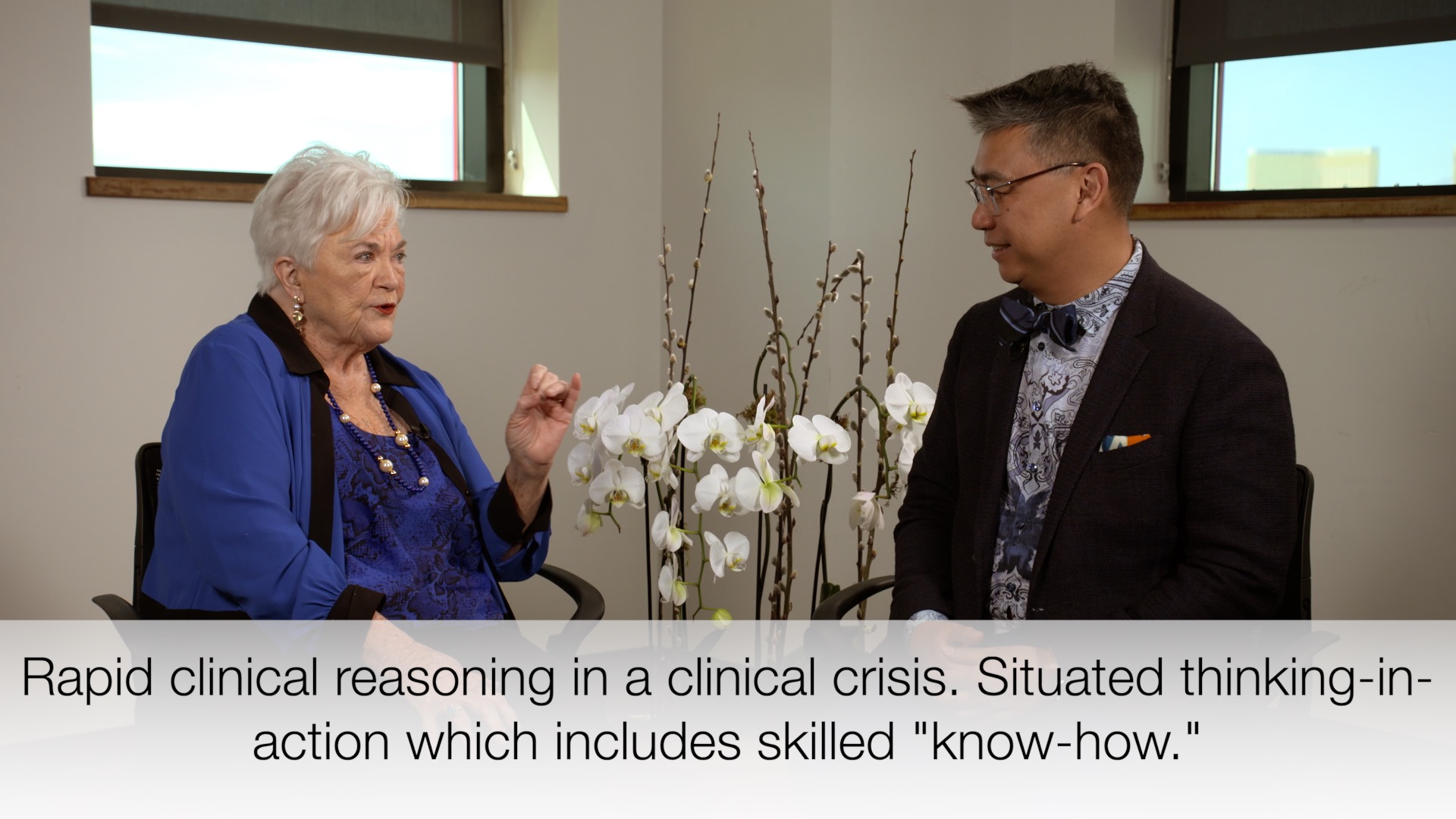Dr. Garrett Chan, RN, PhD, FAAN, provides a clinical example from his own practice as an expert Emergency Department Nurse. Please reflect on the nature of his clinical reasoning, his situational awareness, and his rapid mobilization of the surgical team, as well as how he considered the significance of informing the wife of how critically ill and at risk for dying her husband was prior to surgery. Dr. Chan made it possible for the wife to have a meaningful last opportunity to speak with her husband before he went into surgery. This narrative provides a rich example of how important it is to learn directly from such practice narratives to enrich our clinical imagination, articulate knowledge embedded in practice and make the significance of rapid clinical reasoning in an acute situation.
video shot on site and at the courtesy of UNLV School of Nursing
Video Library
Our comprehensive Educating Nurses video library is available to subscribers only. To become a subscriber click the button below.
Join now for full access

Thank you so much. This is a powerful real life case scenario. This is such an exceptional example of excellent scientific reasoning combined with Dr. Garrett Chan telling of how he entered the story fully, embracing the humanity of this couple and embodying engagement that exemplifies all aspects of holistic care (clinical and practical reasoning, qualitative distinctions, listening and noticing, being present). Dr. Chan anticipated the grave diagnosis and the the possibility of loss of life and opened up a pathway for the wife to spend time with husband – to share her love. A powerful picture of how healing comes in all forms. For this wife, this opportunity to share with her husband prior to the OR extends healing to her in her grief as she was able to say what she wanted to (and we know as nurses the unconscious patient hears). This impacts her wellness in the end too. What a full circle of beautiful care with a full dynamic approach. Thank you.
I think that one of the problems with nursing, as I’ve noticed over the years, is that with increased patients in our loads, there’s less time for truly compassionate care. For example: the cart nurse in rehab is assigned 15 patients due to a medium to high accuity. One or more of those 15 patients might also be Hospice care. The nurse on the cart makes sure the patient has meds as needed and gives an occasional hug to the family member at the bedside. The Hospice nurse might visit once per week. But truly, there’s so little time for doing things like making sure there’s a complimentary cart with water or tea or coffee and crackers at the bedside. There’s little time to make sure there are kleenex’s in the room or to reach out to the social worker to make sure that the patient has had time to reminisce with the family members and make peace with God or make peace with the universe as they are dying over their final week(s). In emergency situations, the ER nurse is busy doing a million little things–the family might not get called at all. This happened to my family. My father and uncles were involved in an MVA. My dad was in the front seat passenger side. The car was hit on that side and mushed. My dad and uncles were taken to the nearest hospital. They were placed in separate rooms. My uncle who finally remembered he’d be missed; he was the driver and suffered a concussion. About 3-4 hrs later, called his daughter to let her know they’d be home a little later, they were in a little fender bender and would be driving home later. He was out of it and my cousin immediately called an aunt who instinctively knew to call around to track down where they might be. Due to injuries, my father was taken by ground ambulance to the nearest trauma hospital 2.5 hrs away. Several hours later, we found out that dad was in the hospital. By the time my mom and brother/sister arrived, he had passed away. The police officers and firemen that had to use the jaws of life tool to get dad out did not have info. The nurses in the small town hospital had minimal info. They did not notify anyone. Stuff like this happened. The accident happened about 10 hrs before my dad passed away. We might not have found out for days, if it hadn’t been for my aunt who called around and cousin who saw that her dad was a little out of it after a minor fender bender–he didn’t want her to worry. My dad died, my uncle the driver had a concussion and my uncle in the backseat sustained jaw and facial fractures.